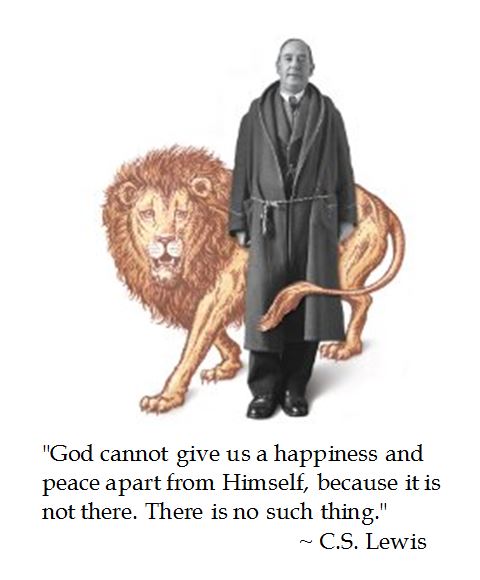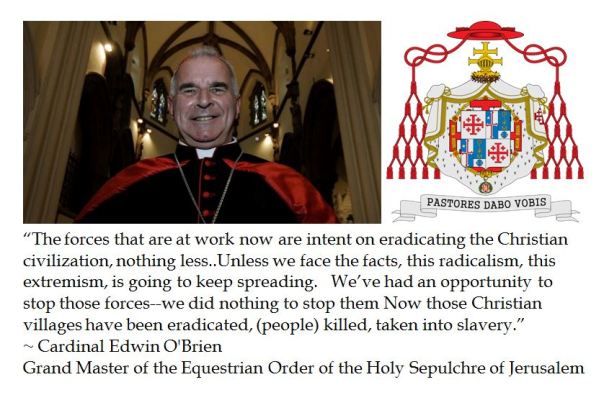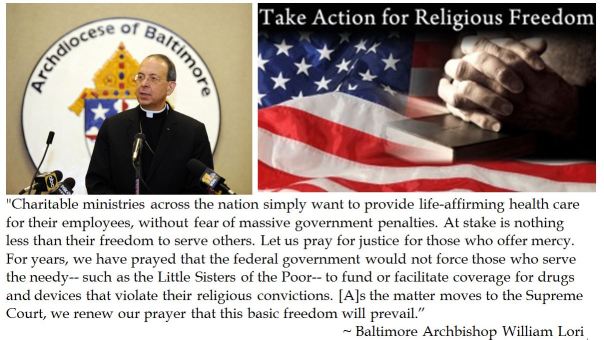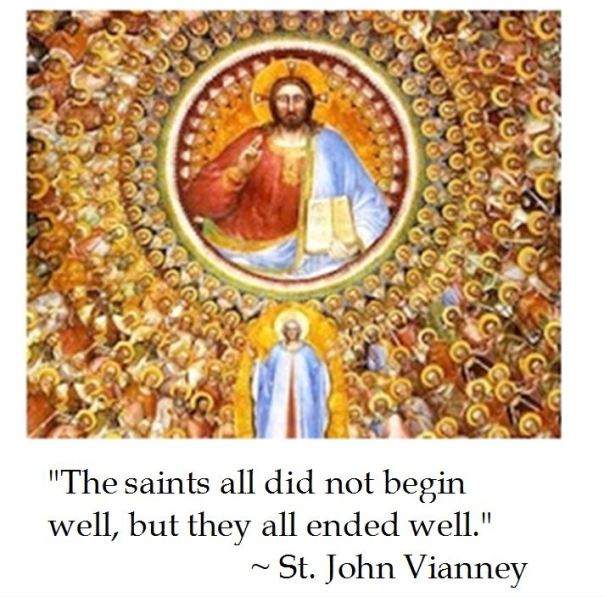Sunday, November 29, 2015
Thursday, November 26, 2015
"Thanksgiving and Praise to our beneficent Father who dwelleth in the Heavens".
In the midst of the Civil War, Abraham Lincoln issued a proclamation for a national day of "Thanksgiving and Praise to our beneficent Father who dwelleth in the Heavens".
h/t: Tony Zapata
Tuesday, November 24, 2015
Sunday, November 22, 2015
Pope Pius XI on Christ the King
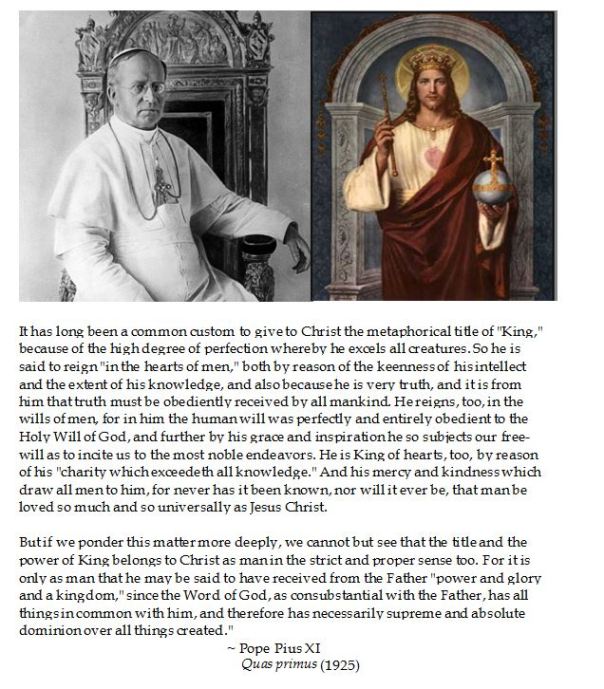
Many of the Catholic Faithful appreciate the Feast of Christ the King as marking the end of the liturgical year. Those who pay attention to the scriptures explore eschatological issues.
But it is useful to understand why the Feast of Christ the King was added to the Church calendar in 1925, through Pope Pius XI's Apostolic Letter Quas primus (1925). The Feast of Our Lord Christ the King emerged at a time in which nationalism, secularism, fascism and communism was sweeping the world. It was placed as the last Sunday in October, and was intended to give the faithful strength and courage to live the Kingdom of God in this world.
In a motu propio Mysterii Paschalis (1969) by Pope Blessed Paul VI, the feast was moved up to be a Solemnity and given a new formal name "Our Lord Jesus Christ, King of the Universe". By moving it to the last Sunday on the liturgical calendar, the significance of last things becomes more poignant.
Many Protestant and Orthodox Christians, such as the Anglicans, Lutherans and the Russian Orthodox outside of Russia followed the motu propio after 1970 and moved celebration of "Christ the King" to the last Sunday before the start of Advent.
H/T: Fr. Geoffrey Plant, St. Michael's Catholic Church, Lane Cove, Archdiocese of Sydney, Australia
Friday, November 20, 2015
Sunday, November 15, 2015
Friday, November 13, 2015
Wednesday, November 11, 2015
Archbishop Lori Urges Praying for Religious Freedom
The United States Supreme Court has taken up the case of the Little Sisters of the Poor objecting to the HHS Contraception Mandate (through the Qualified Health Plans) in Obamacare.
Archbishop Lori has long served as the U.S. Council of Catholic Bishop's Chairman of Committee for Religious Liberty and has spearheaded the annual Fortnight for Freedom initiative to celebrate and educate Americans about our Fundamental First Freedom--the free exercise of religion.
 |
| St. Jeanne Jugan, Little Sisters of the Poor |
Tuesday, November 10, 2015
Pope Francis: "You can say today we are not living an era of change but a change of era"
During the 5th National Ecclesial Convention in Florence Italy, Pope Francis gave 45 minutes of remarks reflecting upon the Convention's theme of "In Jesus Christ, the New Humanism".
The Holy Father warned that Pelegianism (a heresy denying original sin) and Gnosticism (a heresy denying Christ's divinity) are temptations which defeat a true Christian humanism.
In this context, Pope Francis' exhortation to companion in Christ to all not limited by a closed system of doctrine makes more sense. Pope Francis voiced a desire of a happy church with a face of a mother who understands, caresses and accompanies.
These pastoral pronouncements echo the weltanshaaung of this papacy and look forward to the year of mercy.
What is concerning is the inference that Catholic doctrine can change, that moves and grows in the flesh of Jesus Christ. This doctrinal ambiguity led to much of the consternation concerning the recent Synod on the Family, in which "Mercy driven" (liberal) prelates may bend doctrine on marriage to accommodate civilly divorced and remarried Catholics so they receive Communion.
John Boehner on Catholic Guilt
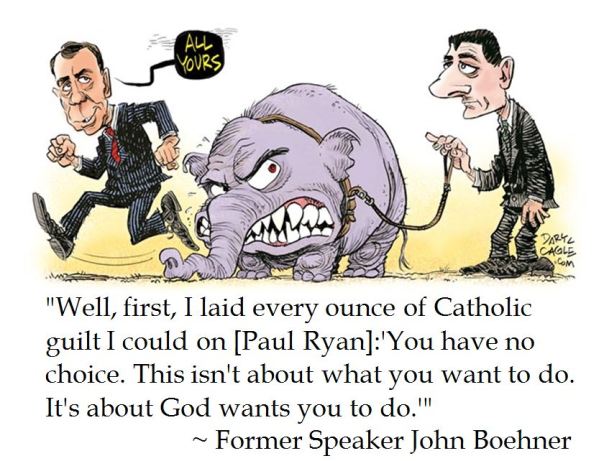
It is dubious whether Boehner's pile of Catholic guilt was the deciding factor in new House Speaker Paul D. Ryan's decision making but the State of the Union episode illustrates the Ignatian admonition about discernment. Manipulating someone in order to escape a hard fate certainly seems like some bad spirits.
Monday, November 9, 2015
Tuesday, November 3, 2015
Pending "Time Bombs" in Synod '15 Final Report
Rorate-Caeli published an exclusive long-form interview with Bishop Athanasius Scheider from the Diocese of Astana, Kazhakstan which critiqued controversial paragraphs contained in the Synod of the Family's Final Report as being "time bombs".
The concern which many faithful who believe in the Gospel admonition that marriage is a sacrament between a man and a women which can not be loosened by divorce,. Thus, subsequent unions without an ecclesiastical declaration of nullity (i.e. Annulments which parties did not enter into a covenant of marriage) puts Catholics into a mortal sin of adultery.
Much like the documents from Vatican II tried to paper over serious divergences of opinion to claim a consensus document, the Synod of the Family's Final Report did not enumerate a change in doctrine toward neo Mosaic understandings of divorce. But the ambiguity in paragraph 85 is worrisome. The Synod '15 Final Report quoted Pope Saint John Paul II's Apostolic Exhortation Familiaris Consortio (1981), but left out an important portion:
“The way to the Eucharist can only be granted to those who take on themselves the duty to live in complete continence, that is, by abstinence from the acts proper to married couples.".
WIthout that decisive language, it inspires "merciful" bishops to implement some means of gradualism, in creating a pathway to the Eucharist for divorced and civilly remarried Catholics.
It is unclear how Pope Francis will act upon the Synod of the Family's Final Report. But the Holy See needed to knock down a recent rumor that during the upcoming year of mercy, all divorced Catholics who asked would be admitted to the Sacraments. A more likely scenario is that under a Pope Francis notion of Synodality, prelates who are inclined (or pecuniarily motivated) could implement gradualism on this issue for their own flock.
Cardinal Donald Wuerl on the Fruits of the Synod of the Family
In order to discern what Cardinal Donald Wuerl meant about the fruits of the Ordinary Synod on the Family, it was necessary to learn the term antinomian,

